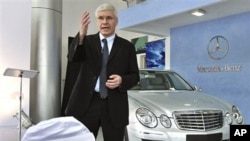When businessmen, lawyers, doctors and other professionals in the town of Aurangabad in Western India purchased nearly 150 Mercedes Benz cars in a single day last month, they got what they wanted: attention.
The sight of Mercedes on the roads also whet the town's appetite for more luxury cars. Another group of about 100 people got together and they plan to order BMWs - again on a single day.
Aurangabad, a city of two million residents, lies in a cotton-growing belt and is close to historic caves visited by tourists in Maharashtra state. As the economy has boomed, it has transformed from a trading town to an industrial hub where Indian and multinational companies have established many factories.
Image change
Sacheen Mulay is the president of the local Chambers of Commerce and Industry and one of the proud Mercedes owners. He says the car buyers wanted to change the image of the town as a backward, sleepy destination.
"Buying a 150 Mercedes is not a joke," Mulay insisted. "We wanted recognition in the world. Aurangabad is not a small place. We are potential buyers and very upcoming entrepreneurs are there in Aurangabad."
While big cities such as Delhi, Mumbai and Bangalore have attracted the attention of Western retail companies, not many have ventured into India's smaller towns.
Big potential
But retail consultants say these cities - with populations of between two and five million - offer huge potential.
Punendu Kumar at consulting firm Technopak says residents here were not known for conspicuous consumption in the past, but that is changing. He expects many companies to target these consumers in the coming years.
"You see these people getting more aware of lot of products and lot of other categories where they can spend money on," Kumar explained. "I see that's the way to go and they will become the hub for expansion."
Aurangabad is showing the way. A huge shopping mall that opened last month has become popular with residents. But they want much more - luxury brands, a bowling alley, and a nightclub.
Massive Indian Luxury Car Buy Attracts Attention




